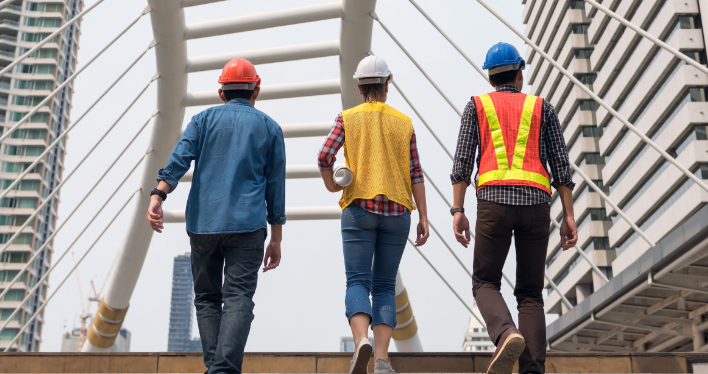The construction industry is one of the most hazardous sectors to work in, with a high potential for accidents, injuries, and fatalities. As such, maintaining stringent health and safety standards is not only a legal obligation but also a moral responsibility for construction businesses. One of the most effective ways to ensure that your company complies with industry standards and prioritises safety is by achieving health and safety accreditation, such as SSIP Accreditation. This certification helps construction companies demonstrate their commitment to protecting employees, contractors, and clients from workplace hazards. Here’s why health and safety accreditation is critical for the construction industry.
1. Ensures Compliance with Health and Safety Regulations
In the construction industry, compliance with health and safety regulations is essential for avoiding legal penalties, fines, and even work stoppages. Health and safety accreditation, such as SSIP Accreditation, ensures that your business meets national safety standards and regulations. By becoming accredited, you demonstrate that your company has robust health and safety systems in place, and that these systems are regularly audited to maintain compliance.
Accreditation not only helps you stay on top of regulatory requirements but also gives you peace of mind that your employees and contractors are working in a safe environment. Moreover, compliance reduces the risk of costly legal battles or government-imposed fines for safety violations, which can harm your company’s reputation and financial stability.
2. Improves Workplace Safety and Reduces Accidents
Construction sites are inherently high-risk environments, with dangers ranging from heavy machinery and equipment to working at heights and handling hazardous materials. Health and safety accreditation programs emphasise the importance of hazard identification, risk assessment, and the implementation of proper safety protocols. Additionally, when paired with solutions like this builder management system which simplifies health and safety, environmental, and quality processes, you can be sure your business will stay abreast of any necessary regulations, meaning that all of your staff will remain safe from day to day onsite.
Beyond this, by obtaining SSIP Accreditation, you commit to continuously improving workplace safety through regular audits and assessments. This proactive approach to managing risks reduces the likelihood of accidents and injuries on site. When workers feel that their safety is prioritised, it boosts morale and productivity, leading to a healthier and more efficient workforce.
By obtaining SSIP Accreditation, you commit to continuously improving workplace safety through regular audits and assessments. This proactive approach to managing risks reduces the likelihood of accidents and injuries on site. When workers feel that their safety is prioritised, it boosts morale and productivity, leading to a healthier and more efficient workforce.
3. Enhances Business Reputation and Competitiveness
In an increasingly competitive construction industry, reputation matters. Clients, contractors, and partners are more likely to work with companies that demonstrate a clear commitment to safety and compliance. Achieving SSIP Accreditation showcases your company’s dedication to maintaining the highest health and safety standards, giving you a competitive edge when bidding for projects.
Accreditation can also open doors to larger and more prestigious contracts, as many clients—particularly in the public sector—require contractors to be accredited. Companies that invest in health and safety certification demonstrate their reliability and professionalism, making them more attractive to prospective clients who value safety and compliance.
4. Streamlines Contractor Management
For construction companies that work with subcontractors, managing health and safety compliance across multiple teams can be a complex task. Health and safety accreditation helps streamline contractor management by ensuring that all parties involved in a project adhere to the same high standards.
With SSIP Accreditation, you can verify that your subcontractors and partners also meet industry-approved safety criteria. This ensures that everyone working on the project follows the same safety protocols, reducing the risk of accidents and creating a more cohesive and efficient work environment.
5. Minimises Financial and Legal Risks
Accidents and unsafe working conditions can result in significant financial and legal repercussions for construction companies. Injuries on the job site can lead to expensive compensation claims, insurance premium hikes, and even lawsuits. Additionally, companies found in violation of safety regulations may face fines or sanctions that damage their bottom line.
By achieving health and safety accreditation, construction companies can mitigate these risks. Accreditation requires that companies have comprehensive safety procedures in place, reducing the likelihood of accidents and the financial burdens that come with them. Furthermore, having an accreditation like SSIP in place can lower insurance premiums, as insurers often view accredited companies as lower risk.
6. Boosts Employee Morale and Retention
A company that invests in health and safety is one that shows it values its employees. Workers who feel safe and protected on the job are more likely to be satisfied with their workplace and less likely to seek employment elsewhere. Prioritising health and safety helps reduce absenteeism due to workplace injuries and improves overall employee morale.
For construction companies, where skilled labour is critical, improving worker retention through a commitment to safety is key to maintaining a strong, experienced workforce. Health and safety accreditation demonstrates to employees that their well-being is a top priority, creating a positive work culture that fosters loyalty and long-term retention.
Conclusion
Health and safety accreditation, such as SSIP Accreditation, is more than just a box to check—it’s a critical component of running a responsible and successful construction business. From ensuring regulatory compliance and reducing accidents to enhancing your reputation and minimising legal risks, accreditation offers a range of benefits that positively impact both your workforce and your business. In an industry where safety is paramount, investing in health and safety accreditation is essential for protecting your team, growing your business, and securing long-term success.
Discover How Health and Safety Accreditation Can Transform Your Business at Buzz Revolve




